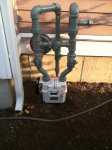Folks,
Just looking to poll to experts and pool owners. What size natural gas line do you have hooked up to your 400k btu heater?
I ask because a good friend and neighbor of mine says the 1.25" is overkill for the volume required. He says a 1" line is more than sufficient. He is also a gas fitter for a local utility company so I trust his judgment.
Thoughts? :?
JD
Just looking to poll to experts and pool owners. What size natural gas line do you have hooked up to your 400k btu heater?
I ask because a good friend and neighbor of mine says the 1.25" is overkill for the volume required. He says a 1" line is more than sufficient. He is also a gas fitter for a local utility company so I trust his judgment.
Thoughts? :?
JD


